Criminal Law Module: Alibi Evidence, Jury System and Legal Cases
VerifiedAdded on 2022/10/10
|6
|1461
|389
Report
AI Summary
This report provides a comprehensive overview of alibi evidence and jury systems within the context of criminal law. It begins by defining alibi, its significance in criminal investigations, and the factors influencing its believability, including the taxonomy of alibi. The report then discusses the challenges faced by innocent providers of alibis, such as memory limitations and uncorroborated accounts. The report also examines the role of juries, contrasting inquisitorial and adversarial legal systems, and highlights the historical evolution of juries, referencing the Magna Carta. It explains the structure of juries in the UK and Scotland, including verdict options. The report further explores the functions of judges and juries, emphasizing their distinct roles in legal proceedings, and illustrates these concepts with the case of Liebeck v. McDonald’s. The document concludes by underscoring the impossibility of replacing juries with judges due to their separate responsibilities in determining facts and applying the law, respectively.
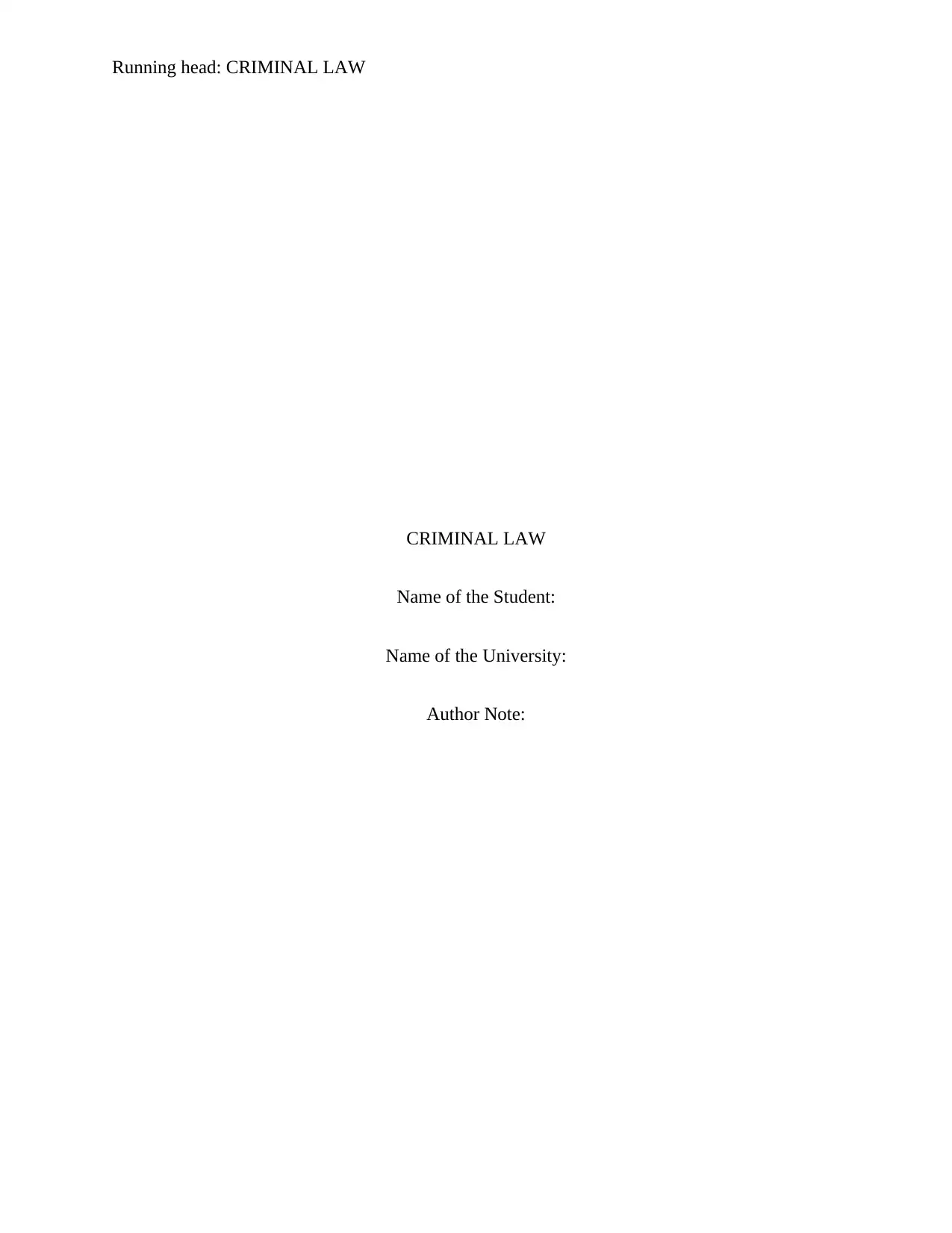
Running head: CRIMINAL LAW
CRIMINAL LAW
Name of the Student:
Name of the University:
Author Note:
CRIMINAL LAW
Name of the Student:
Name of the University:
Author Note:
Paraphrase This Document
Need a fresh take? Get an instant paraphrase of this document with our AI Paraphraser
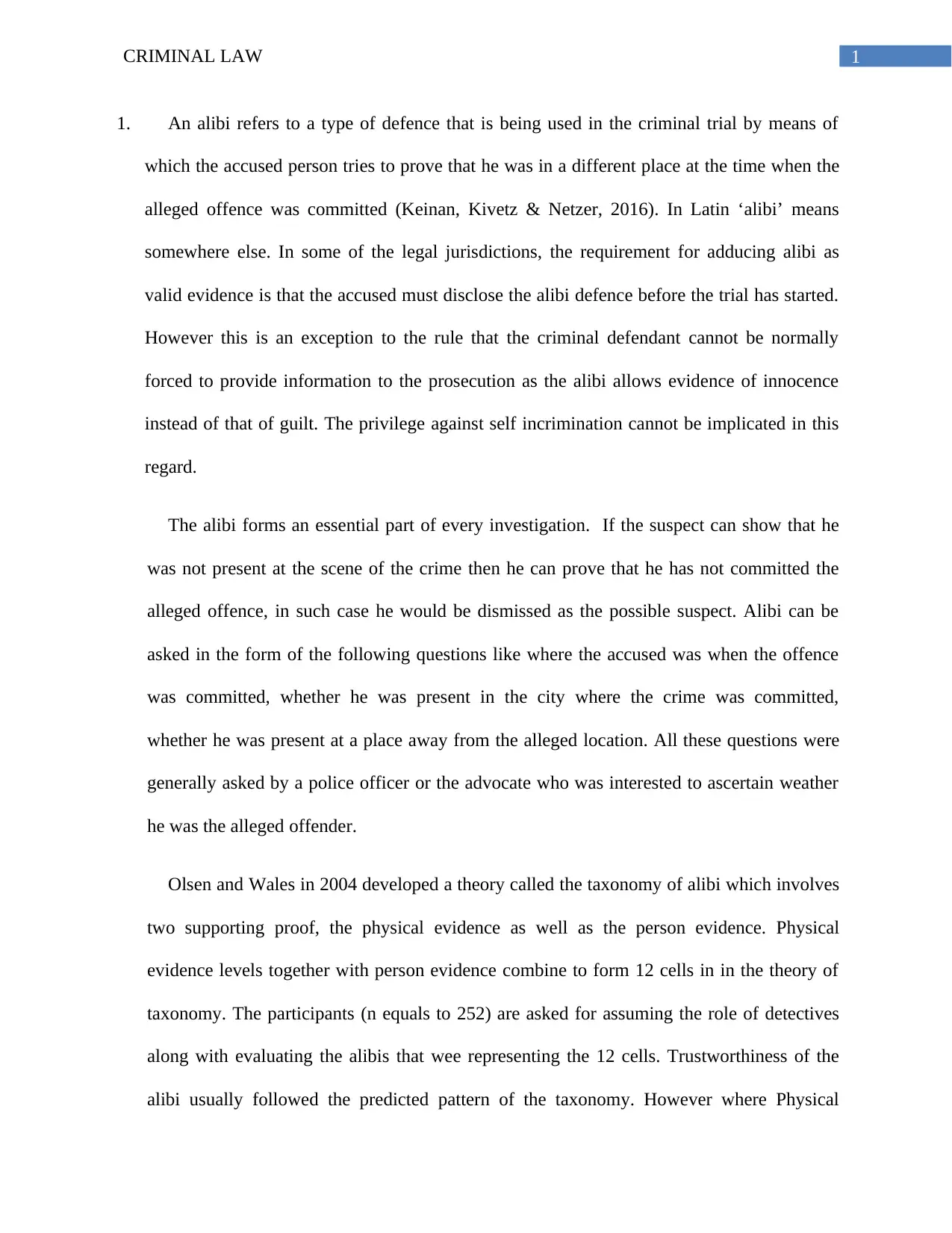
1CRIMINAL LAW
1. An alibi refers to a type of defence that is being used in the criminal trial by means of
which the accused person tries to prove that he was in a different place at the time when the
alleged offence was committed (Keinan, Kivetz & Netzer, 2016). In Latin ‘alibi’ means
somewhere else. In some of the legal jurisdictions, the requirement for adducing alibi as
valid evidence is that the accused must disclose the alibi defence before the trial has started.
However this is an exception to the rule that the criminal defendant cannot be normally
forced to provide information to the prosecution as the alibi allows evidence of innocence
instead of that of guilt. The privilege against self incrimination cannot be implicated in this
regard.
The alibi forms an essential part of every investigation. If the suspect can show that he
was not present at the scene of the crime then he can prove that he has not committed the
alleged offence, in such case he would be dismissed as the possible suspect. Alibi can be
asked in the form of the following questions like where the accused was when the offence
was committed, whether he was present in the city where the crime was committed,
whether he was present at a place away from the alleged location. All these questions were
generally asked by a police officer or the advocate who was interested to ascertain weather
he was the alleged offender.
Olsen and Wales in 2004 developed a theory called the taxonomy of alibi which involves
two supporting proof, the physical evidence as well as the person evidence. Physical
evidence levels together with person evidence combine to form 12 cells in in the theory of
taxonomy. The participants (n equals to 252) are asked for assuming the role of detectives
along with evaluating the alibis that wee representing the 12 cells. Trustworthiness of the
alibi usually followed the predicted pattern of the taxonomy. However where Physical
1. An alibi refers to a type of defence that is being used in the criminal trial by means of
which the accused person tries to prove that he was in a different place at the time when the
alleged offence was committed (Keinan, Kivetz & Netzer, 2016). In Latin ‘alibi’ means
somewhere else. In some of the legal jurisdictions, the requirement for adducing alibi as
valid evidence is that the accused must disclose the alibi defence before the trial has started.
However this is an exception to the rule that the criminal defendant cannot be normally
forced to provide information to the prosecution as the alibi allows evidence of innocence
instead of that of guilt. The privilege against self incrimination cannot be implicated in this
regard.
The alibi forms an essential part of every investigation. If the suspect can show that he
was not present at the scene of the crime then he can prove that he has not committed the
alleged offence, in such case he would be dismissed as the possible suspect. Alibi can be
asked in the form of the following questions like where the accused was when the offence
was committed, whether he was present in the city where the crime was committed,
whether he was present at a place away from the alleged location. All these questions were
generally asked by a police officer or the advocate who was interested to ascertain weather
he was the alleged offender.
Olsen and Wales in 2004 developed a theory called the taxonomy of alibi which involves
two supporting proof, the physical evidence as well as the person evidence. Physical
evidence levels together with person evidence combine to form 12 cells in in the theory of
taxonomy. The participants (n equals to 252) are asked for assuming the role of detectives
along with evaluating the alibis that wee representing the 12 cells. Trustworthiness of the
alibi usually followed the predicted pattern of the taxonomy. However where Physical
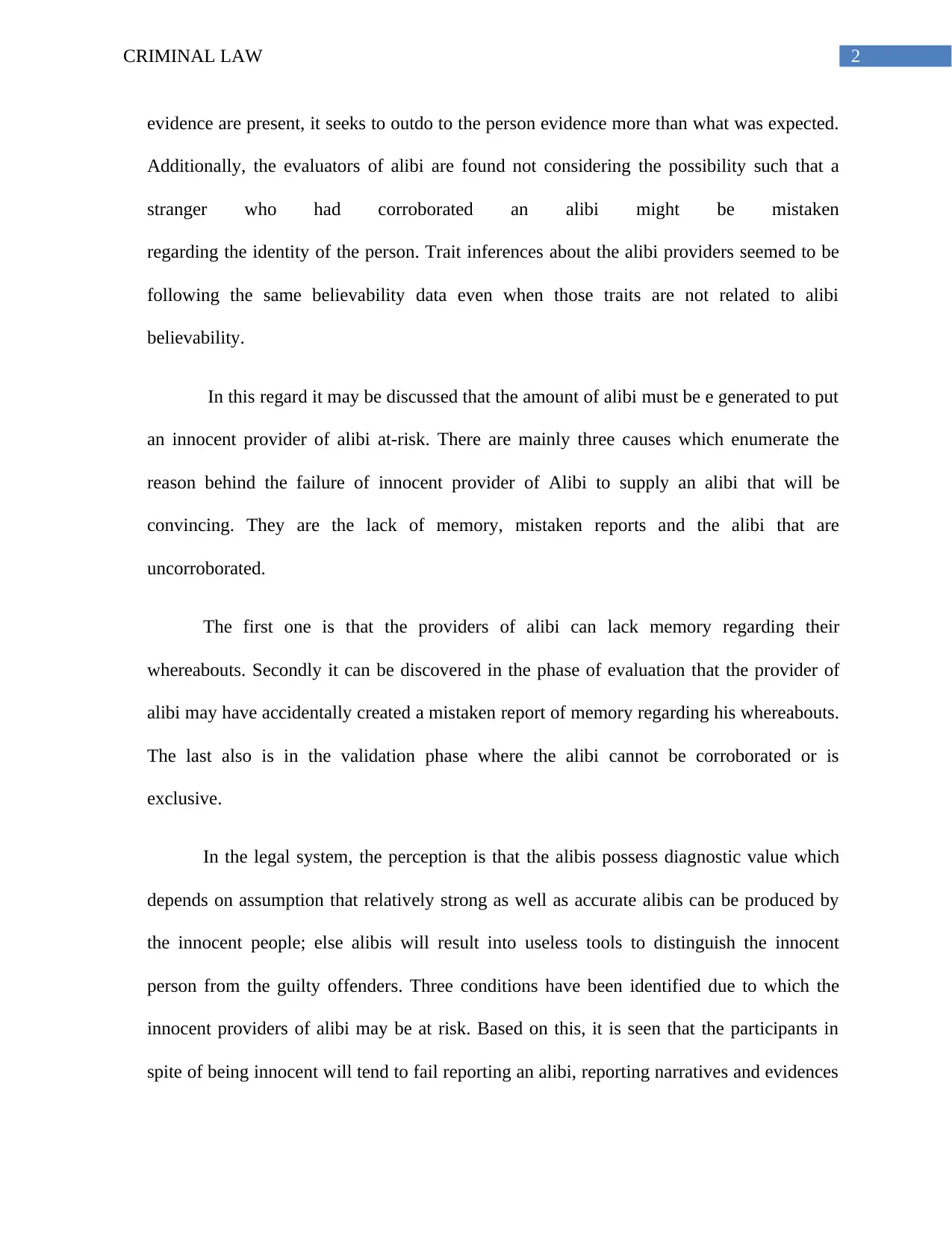
2CRIMINAL LAW
evidence are present, it seeks to outdo to the person evidence more than what was expected.
Additionally, the evaluators of alibi are found not considering the possibility such that a
stranger who had corroborated an alibi might be mistaken
regarding the identity of the person. Trait inferences about the alibi providers seemed to be
following the same believability data even when those traits are not related to alibi
believability.
In this regard it may be discussed that the amount of alibi must be e generated to put
an innocent provider of alibi at-risk. There are mainly three causes which enumerate the
reason behind the failure of innocent provider of Alibi to supply an alibi that will be
convincing. They are the lack of memory, mistaken reports and the alibi that are
uncorroborated.
The first one is that the providers of alibi can lack memory regarding their
whereabouts. Secondly it can be discovered in the phase of evaluation that the provider of
alibi may have accidentally created a mistaken report of memory regarding his whereabouts.
The last also is in the validation phase where the alibi cannot be corroborated or is
exclusive.
In the legal system, the perception is that the alibis possess diagnostic value which
depends on assumption that relatively strong as well as accurate alibis can be produced by
the innocent people; else alibis will result into useless tools to distinguish the innocent
person from the guilty offenders. Three conditions have been identified due to which the
innocent providers of alibi may be at risk. Based on this, it is seen that the participants in
spite of being innocent will tend to fail reporting an alibi, reporting narratives and evidences
evidence are present, it seeks to outdo to the person evidence more than what was expected.
Additionally, the evaluators of alibi are found not considering the possibility such that a
stranger who had corroborated an alibi might be mistaken
regarding the identity of the person. Trait inferences about the alibi providers seemed to be
following the same believability data even when those traits are not related to alibi
believability.
In this regard it may be discussed that the amount of alibi must be e generated to put
an innocent provider of alibi at-risk. There are mainly three causes which enumerate the
reason behind the failure of innocent provider of Alibi to supply an alibi that will be
convincing. They are the lack of memory, mistaken reports and the alibi that are
uncorroborated.
The first one is that the providers of alibi can lack memory regarding their
whereabouts. Secondly it can be discovered in the phase of evaluation that the provider of
alibi may have accidentally created a mistaken report of memory regarding his whereabouts.
The last also is in the validation phase where the alibi cannot be corroborated or is
exclusive.
In the legal system, the perception is that the alibis possess diagnostic value which
depends on assumption that relatively strong as well as accurate alibis can be produced by
the innocent people; else alibis will result into useless tools to distinguish the innocent
person from the guilty offenders. Three conditions have been identified due to which the
innocent providers of alibi may be at risk. Based on this, it is seen that the participants in
spite of being innocent will tend to fail reporting an alibi, reporting narratives and evidences
⊘ This is a preview!⊘
Do you want full access?
Subscribe today to unlock all pages.

Trusted by 1+ million students worldwide
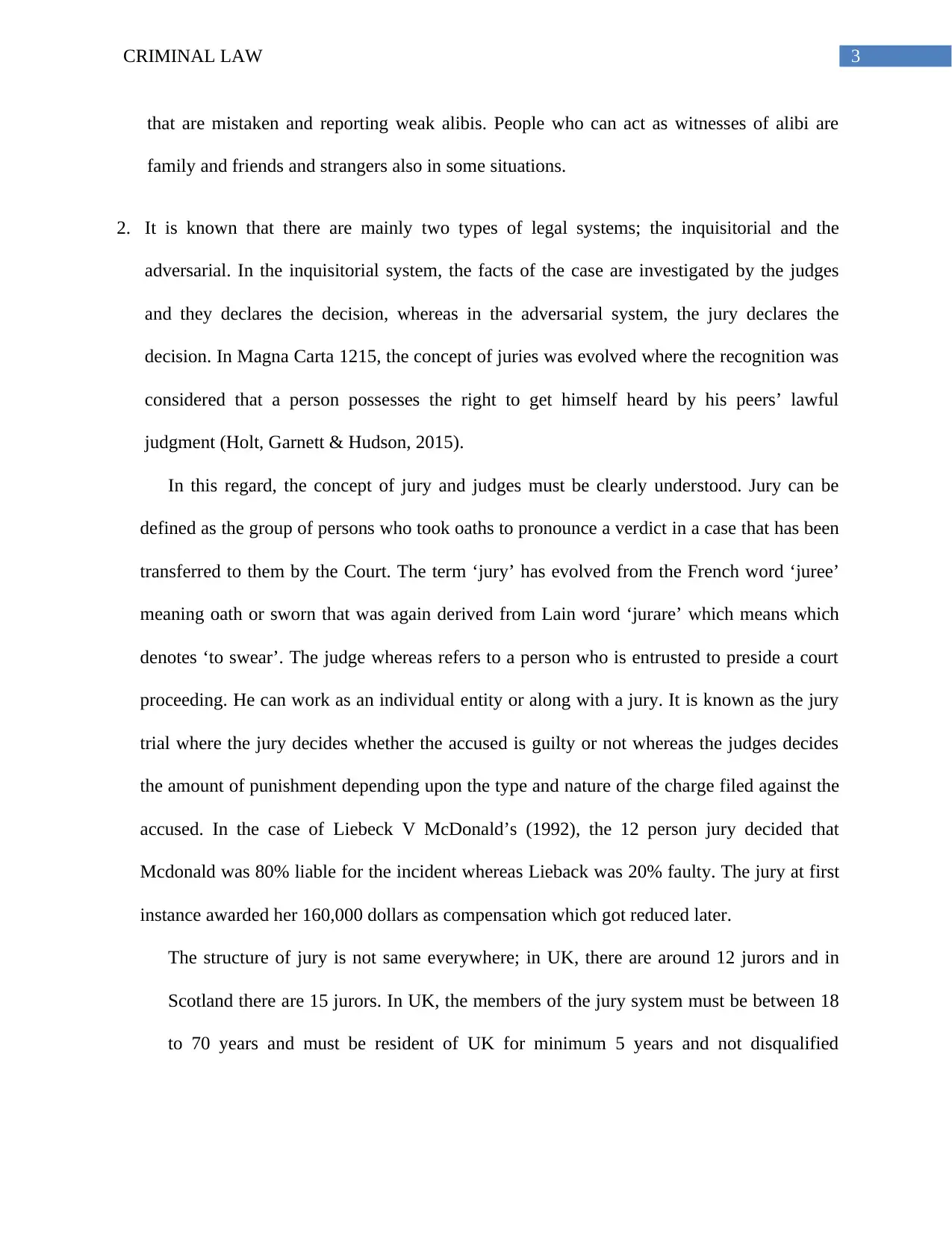
3CRIMINAL LAW
that are mistaken and reporting weak alibis. People who can act as witnesses of alibi are
family and friends and strangers also in some situations.
2. It is known that there are mainly two types of legal systems; the inquisitorial and the
adversarial. In the inquisitorial system, the facts of the case are investigated by the judges
and they declares the decision, whereas in the adversarial system, the jury declares the
decision. In Magna Carta 1215, the concept of juries was evolved where the recognition was
considered that a person possesses the right to get himself heard by his peers’ lawful
judgment (Holt, Garnett & Hudson, 2015).
In this regard, the concept of jury and judges must be clearly understood. Jury can be
defined as the group of persons who took oaths to pronounce a verdict in a case that has been
transferred to them by the Court. The term ‘jury’ has evolved from the French word ‘juree’
meaning oath or sworn that was again derived from Lain word ‘jurare’ which means which
denotes ‘to swear’. The judge whereas refers to a person who is entrusted to preside a court
proceeding. He can work as an individual entity or along with a jury. It is known as the jury
trial where the jury decides whether the accused is guilty or not whereas the judges decides
the amount of punishment depending upon the type and nature of the charge filed against the
accused. In the case of Liebeck V McDonald’s (1992), the 12 person jury decided that
Mcdonald was 80% liable for the incident whereas Lieback was 20% faulty. The jury at first
instance awarded her 160,000 dollars as compensation which got reduced later.
The structure of jury is not same everywhere; in UK, there are around 12 jurors and in
Scotland there are 15 jurors. In UK, the members of the jury system must be between 18
to 70 years and must be resident of UK for minimum 5 years and not disqualified
that are mistaken and reporting weak alibis. People who can act as witnesses of alibi are
family and friends and strangers also in some situations.
2. It is known that there are mainly two types of legal systems; the inquisitorial and the
adversarial. In the inquisitorial system, the facts of the case are investigated by the judges
and they declares the decision, whereas in the adversarial system, the jury declares the
decision. In Magna Carta 1215, the concept of juries was evolved where the recognition was
considered that a person possesses the right to get himself heard by his peers’ lawful
judgment (Holt, Garnett & Hudson, 2015).
In this regard, the concept of jury and judges must be clearly understood. Jury can be
defined as the group of persons who took oaths to pronounce a verdict in a case that has been
transferred to them by the Court. The term ‘jury’ has evolved from the French word ‘juree’
meaning oath or sworn that was again derived from Lain word ‘jurare’ which means which
denotes ‘to swear’. The judge whereas refers to a person who is entrusted to preside a court
proceeding. He can work as an individual entity or along with a jury. It is known as the jury
trial where the jury decides whether the accused is guilty or not whereas the judges decides
the amount of punishment depending upon the type and nature of the charge filed against the
accused. In the case of Liebeck V McDonald’s (1992), the 12 person jury decided that
Mcdonald was 80% liable for the incident whereas Lieback was 20% faulty. The jury at first
instance awarded her 160,000 dollars as compensation which got reduced later.
The structure of jury is not same everywhere; in UK, there are around 12 jurors and in
Scotland there are 15 jurors. In UK, the members of the jury system must be between 18
to 70 years and must be resident of UK for minimum 5 years and not disqualified
Paraphrase This Document
Need a fresh take? Get an instant paraphrase of this document with our AI Paraphraser
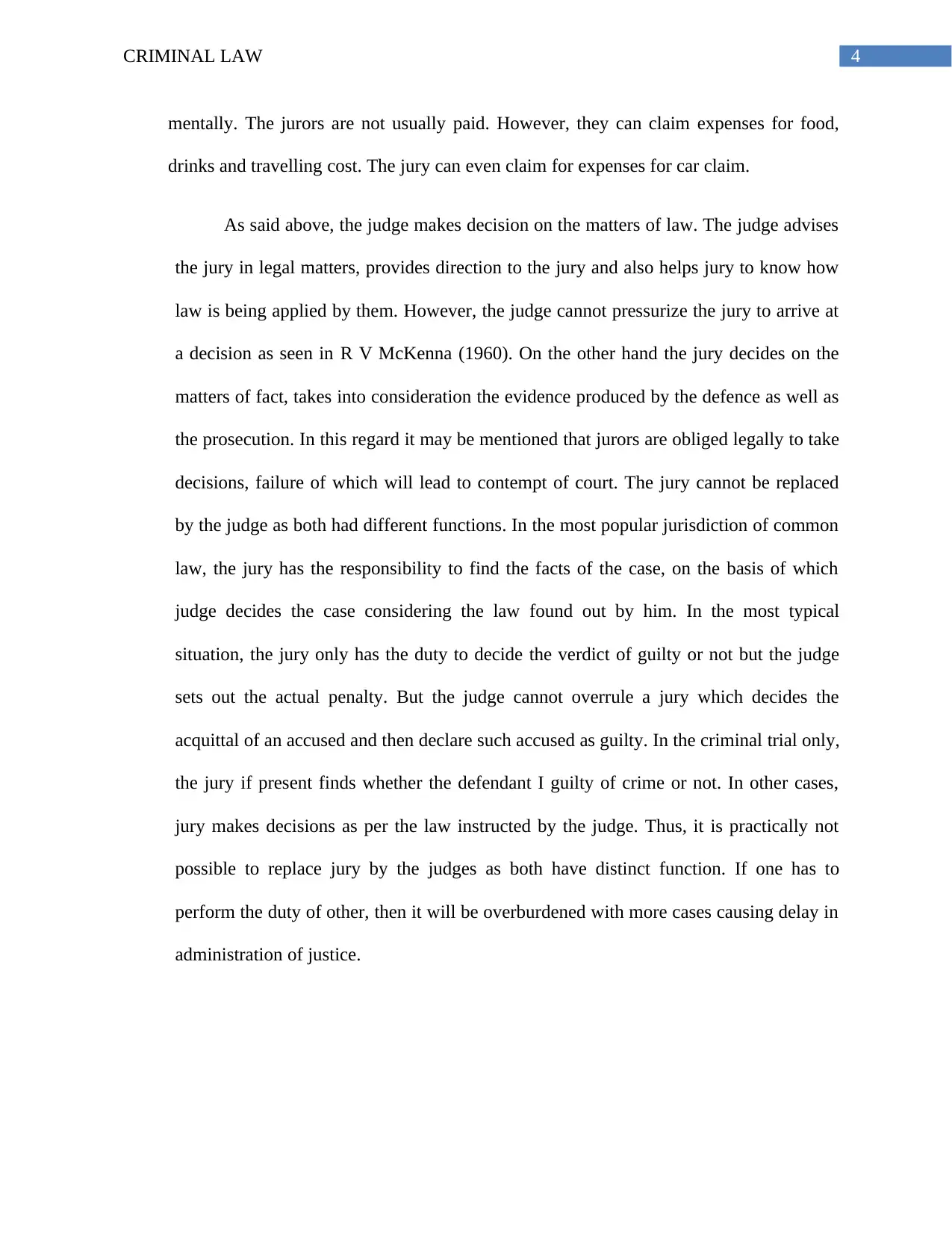
4CRIMINAL LAW
mentally. The jurors are not usually paid. However, they can claim expenses for food,
drinks and travelling cost. The jury can even claim for expenses for car claim.
As said above, the judge makes decision on the matters of law. The judge advises
the jury in legal matters, provides direction to the jury and also helps jury to know how
law is being applied by them. However, the judge cannot pressurize the jury to arrive at
a decision as seen in R V McKenna (1960). On the other hand the jury decides on the
matters of fact, takes into consideration the evidence produced by the defence as well as
the prosecution. In this regard it may be mentioned that jurors are obliged legally to take
decisions, failure of which will lead to contempt of court. The jury cannot be replaced
by the judge as both had different functions. In the most popular jurisdiction of common
law, the jury has the responsibility to find the facts of the case, on the basis of which
judge decides the case considering the law found out by him. In the most typical
situation, the jury only has the duty to decide the verdict of guilty or not but the judge
sets out the actual penalty. But the judge cannot overrule a jury which decides the
acquittal of an accused and then declare such accused as guilty. In the criminal trial only,
the jury if present finds whether the defendant I guilty of crime or not. In other cases,
jury makes decisions as per the law instructed by the judge. Thus, it is practically not
possible to replace jury by the judges as both have distinct function. If one has to
perform the duty of other, then it will be overburdened with more cases causing delay in
administration of justice.
mentally. The jurors are not usually paid. However, they can claim expenses for food,
drinks and travelling cost. The jury can even claim for expenses for car claim.
As said above, the judge makes decision on the matters of law. The judge advises
the jury in legal matters, provides direction to the jury and also helps jury to know how
law is being applied by them. However, the judge cannot pressurize the jury to arrive at
a decision as seen in R V McKenna (1960). On the other hand the jury decides on the
matters of fact, takes into consideration the evidence produced by the defence as well as
the prosecution. In this regard it may be mentioned that jurors are obliged legally to take
decisions, failure of which will lead to contempt of court. The jury cannot be replaced
by the judge as both had different functions. In the most popular jurisdiction of common
law, the jury has the responsibility to find the facts of the case, on the basis of which
judge decides the case considering the law found out by him. In the most typical
situation, the jury only has the duty to decide the verdict of guilty or not but the judge
sets out the actual penalty. But the judge cannot overrule a jury which decides the
acquittal of an accused and then declare such accused as guilty. In the criminal trial only,
the jury if present finds whether the defendant I guilty of crime or not. In other cases,
jury makes decisions as per the law instructed by the judge. Thus, it is practically not
possible to replace jury by the judges as both have distinct function. If one has to
perform the duty of other, then it will be overburdened with more cases causing delay in
administration of justice.
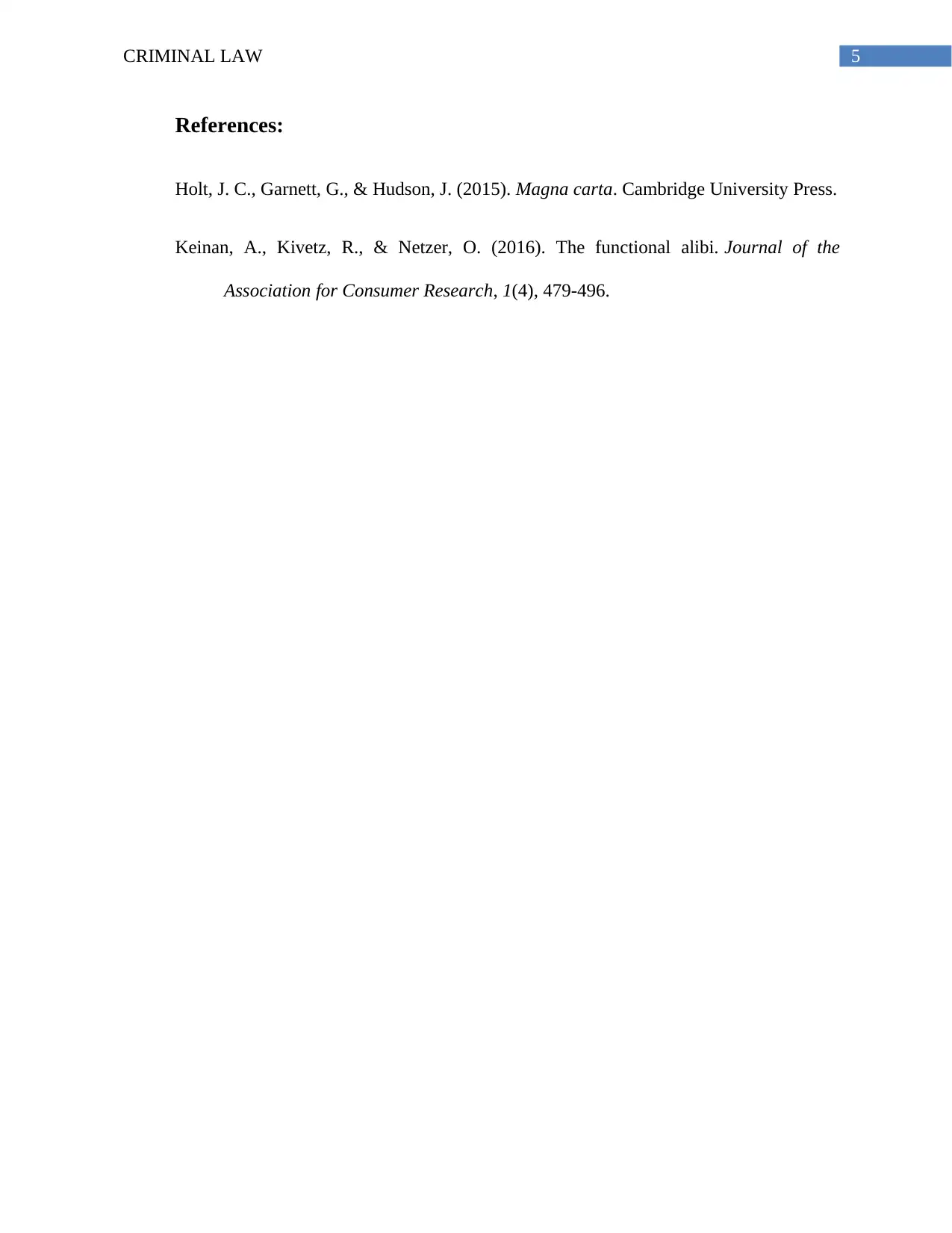
5CRIMINAL LAW
References:
Holt, J. C., Garnett, G., & Hudson, J. (2015). Magna carta. Cambridge University Press.
Keinan, A., Kivetz, R., & Netzer, O. (2016). The functional alibi. Journal of the
Association for Consumer Research, 1(4), 479-496.
References:
Holt, J. C., Garnett, G., & Hudson, J. (2015). Magna carta. Cambridge University Press.
Keinan, A., Kivetz, R., & Netzer, O. (2016). The functional alibi. Journal of the
Association for Consumer Research, 1(4), 479-496.
⊘ This is a preview!⊘
Do you want full access?
Subscribe today to unlock all pages.

Trusted by 1+ million students worldwide
1 out of 6
Related Documents
Your All-in-One AI-Powered Toolkit for Academic Success.
+13062052269
info@desklib.com
Available 24*7 on WhatsApp / Email
![[object Object]](/_next/static/media/star-bottom.7253800d.svg)
Unlock your academic potential
Copyright © 2020–2026 A2Z Services. All Rights Reserved. Developed and managed by ZUCOL.





